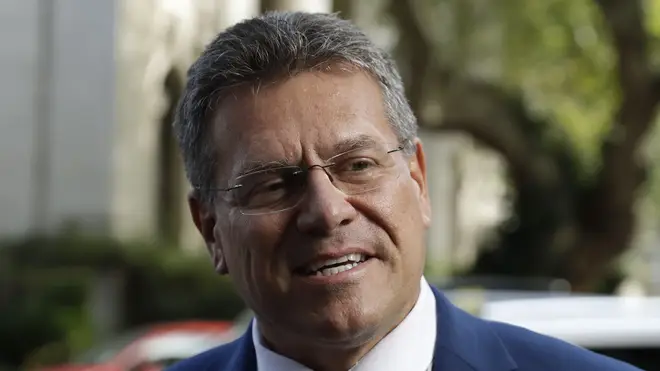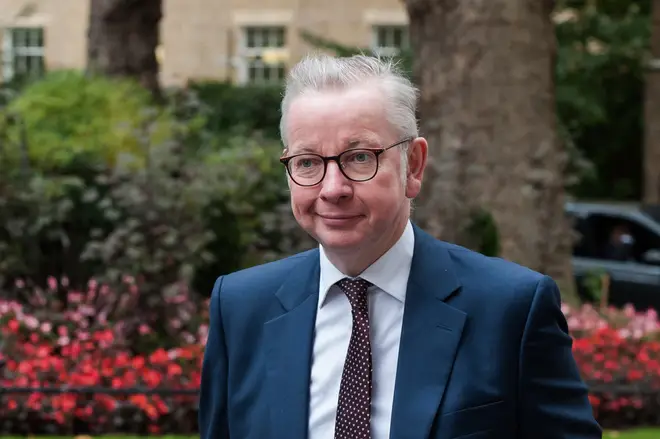
Dean Dunham 9pm - 10pm
10 September 2020, 15:57 | Updated: 10 September 2020, 19:12

Cabinet Office minister Michael Gove has said he told the European Commission vice president that the Government "would not and could not" withdraw its Internal Market Bill.
It comes after the EU said the UK government's plans to override part of the Brexit deal would constitute an "extremely serious" violation of international law.
European Commission vice president Maros Sefcovic also called on the Government to withdraw measures from a Bill that override Boris Johnson's Brexit deal by the end of the month, the EU has said.
He stated that by putting forward this Bill, the UK has seriously damaged trust between the EU and the UK.
"It is now up to the UK government to re-establish that trust," he continued.
Brussels have said the move could put the Good Friday Agreement at risk and rejected the UK government's argument that the aim of the draft Bill is to protect the agreement.
However, Mr Gove insisted the Internal Market Bill is "primarily an economic measure".

A statement released by the EU after the meeting stated: "The Vice-President stated, in no uncertain terms, that the timely and full implementation of the Withdrawal Agreement, including the Protocol on Ireland / Northern Ireland – which Prime Minister Boris Johnson and his government agreed to, and which the UK Houses of Parliament ratified, less than a year ago – is a legal obligation.
"The European Union expects the letter and spirit of this Agreement to be fully respected. Violating the terms of the Withdrawal Agreement would break international law, undermine trust and put at risk the ongoing future relationship negotiations.
"The Withdrawal Agreement entered into force on 1 February 2020 and has legal effects under international law. Since that point in time, neither the EU nor the UK can unilaterally change, clarify, amend, interpret, disregard or disapply the agreement. The Protocol on Ireland / Northern Ireland is an essential part of the Withdrawal Agreement.
"Its aim is to protect peace and stability on the island of Ireland and was the result of long, detailed and difficult negotiations between the EU and the UK."
He also reminded the UK government that "the Withdrawal Agreement contains a number of mechanisms and legal remedies to address violations of the legal obligations contained in the text – which the European Union will not be shy in using".

Irish PM criticises UK plans to change Brexit deal
However, according to a statement published by the Government about the controversial legislation, parliament would not be acting "unconstitutionally" in enacting the UK Internal Market Bill.
It stated: "It is an established principle of international law that a state is obliged to discharge its treaty obligations in good faith. This is, and will remain, the key principle in informing the UK's approach to international relations.
"However, in the difficult and highly exceptional circumstances in which we find ourselves, it is important to remember the fundamental principle of Parliamentary sovereignty.
"Parliament is sovereign as a matter of domestic law and can pass legislation which is in breach of the UK's treaty obligations. Parliament would not be acting unconstitutionally in enacting such legislation."
The statement went on: "The legislation which implements the Withdrawal Agreement, including the Northern Ireland Protocol, is expressly subject to the principle of parliamentary sovereignty.
"Parliament's ability to pass provisions that would take precedence over the Withdrawal Agreement was expressly confirmed in section 38 of the European Union (Withdrawal Agreement) Act 2020, with specific reference to the EU law concept of 'direct effect'."
However, Labour has accused Attorney General Suella Braverman of having "failed in her duty to uphold the rule of law in this country", after Government legal advice on the new Brexit Bill was published.
Shadow attorney general Lord Falconer said: "The Attorney General offers no justification whatsoever for the UK acting in breach of the Northern Ireland Protocol and there is no justification for breaking the terms of that agreement.
"This advice does not address the issue of a breach of international law. The Attorney General has conspicuously failed in her duty to uphold the rule of law in this country."

Irish PM criticises UK plans to change Brexit deal
Lord Frost, Chief Negotiator, said after the negotiations: “We have just completed our eighth round of negotiations with the EU. We covered all issues in some detail, including the most difficult ones.
“These were useful exchanges. However, a number of challenging areas remain and the divergences on some are still significant.
“We have been consistently clear from the start of this process about the basis on which agreement is possible between us. Those fundamentals remain. We have engaged in discussions in all areas. We have consistently made proposals which provide for open and fair competition, on the basis of high standards, in a way which is appropriate to a modern free trade agreement between sovereign and autonomous equals.
“We remain committed to working hard to reach agreement by the middle of October, as the Prime Minister set out earlier this week.
“We have agreed to meet again, as planned, in Brussels next week to continue discussions.”